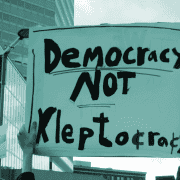|
Getting your Trinity Audio player ready...
|
Image: Flickr/GovernmentZA
By Moepeng Valencia Talane – CW Voices
Never before has South Africa seen the impeachment of a judge over gross misconduct, and yet in February, two such processes were completed. Then we saw the Speaker of Parliament not only resigning from office before the end of her term, but also arrested and arraigned just hours later, for alleged corruption.
‘From Madam Speaker to accused number one’ read one of the many media headlines reacting to Nosiviwe Mapisa-Nqakula’s appearance in court last week. She faces 12 counts of an assortment of serious crimes, including corruption, fraud, money laundering, and racketeering relating to a contract of the Department of Defence and Military Veterans, of which she was minister from 2019 to 2021. She is accused of having bagged just over R4-million in kickbacks from the contractor.
Power and responsibility
In August 2021 Mapisa-Nqakula swopped roles with then national assembly speaker Thandi Modise following a cabinet reshuffle. She is the first of the seven speakers of South Africa’s democratic era to resign from the position before the end of their term, although not the only one to be the subject of controversy while in office.
The position comes with a proportion of responsibility provided for in our Constitution, and not ordinarily accorded other heads of government branches or institutions, as its occupier must demonstrate an above-reproach presence, be a fair arbiter in multi-party debates and deliberations, and have an undoubtable integrity and respect for the rule of law. The National Assembly speaker’s impetus is that of the upkeep of the rule of law in the interest of the voting public responsible for placing members of Parliament over which she presides, to account for how the government of the day runs the country. For these and many other reasons, it is a big deal when the holder of such a position vacates it under a cloud of malfeasance.
While on the one hand the timing of Mapisa-Nqakula’s arrest has brought about questions of politics being at play, it has nevertheless bolstered public sentiments somewhat in the National Prosecuting Authority’s (NPA) ability to hold its own and demonstrate an independence that rejects political power and bias.
We will certainly know more about how it came to build its case as her trial continues, but whether or not the NPA is being used in a political game remains to be seen. In the meantime, it has brought down a powerful figure in the political and statal landscape in a move that will hopefully encourage added scrutiny from the public as to the qualities of the next individual who dares take on the role of Speaker of Parliament.
Incidental turn of events
In the meantime, one can only reflect on the incidental turn of events of the past few weeks. While members of Parliament were voting for the impeachment of judges John Hlophe and Nkola Motata on 27 February, the NPA was wrapping up its case against the very speaker who presided over this historic event.
When it became clear that her own number was up and an arrest was imminent, Mapisa-Nqakula first attempted to interdict it through the courts and when she failed, she resigned because, according to her, she wanted to preserve Parliament’s reputation by acting in the institution’s best interest. The alternative to resigning would have been for her arrest to take effect while she was still in office, but here the optics would have been dire for the ANC ahead of an important election.
So the jury is still out on whose decision it really was.
Misbehaving judges
Just as Mapisa-Nqakula’s fate is highly politicised, so are the impeachments, particularly of Hlophe, which is a good 15 years in the making. The misconduct he is accused of relates to his attempt to influence the outcome of a Constitutional Court matter relating to former president Jacob Zuma in 2008. The process was launched following nine complaints from Justices of the Constitutional Court in 2008 – months after Zuma was elected ANC president in Polokwane – to the Judicial Service Commission that Hlophe tried to influence Justices Chris Jafta and Bess Nkabinde.
Over the 15 years since the complaint, Hlophe has used several legal channels to prevent his removal from the bench over the matter, but his fate was sealed in February, when 305 of the 400 members of the National Assembly voted for his impeachment.
A statement by civil society organisation Judges Matter, noted: “No doubt, Parliament’s impeachment vote … is historically significant. But it is also symbolically important as enforcing both judicial accountability and protecting judicial integrity. In many ways, this is a low moment for the South African judiciary. However, it is also a vindication of South Africa’s strong constitutional mechanisms at play, a fact we should all celebrate.”
The organisation also acknowledges the arduous process of impeaching both judges, calling it a failure based on the length of time each case took to process. Motata’s own case relates to a 2009 drunken driving incident that was followed by his arrest.
Hlophe has indicated an intention to apply to the Constitutional Court to reverse his impeachment, a move that may create some complication as some of the justices would have to recuse themselves for a variety of reasons.
Looking across the three cases, it is important to note the significance of governance principles afforded us not only by our Constitution, but the institutions that regulate the conduct of those who hold critical positions in our society. The independence of the JSC in the case of the judges was paramount to the decision arrived at, whether right or wrong, and the process that led to the National Assembly vote.
Equally, the NPA has endured a lot of criticism in recent years, some of it unfounded, but borne out of the frustrations of millions of South Africans who demand accountability in government leadership for the scourge of corruption that cripples state institutions and hinders service delivery.
While they leave a dirty mark on the reputation of our institutions, the events of the past few weeks have revealed one important truth. Our democracy is at work, proving the inviolability of our Constitution and its principles, and testing the independence of the institutions it provides for to ensure accountability and equality before the law. However, the price of such is that we continue to learn that the seniority and importance of an individual’s position is never a guarantee of their infallibility and integrity.









Leave a Reply